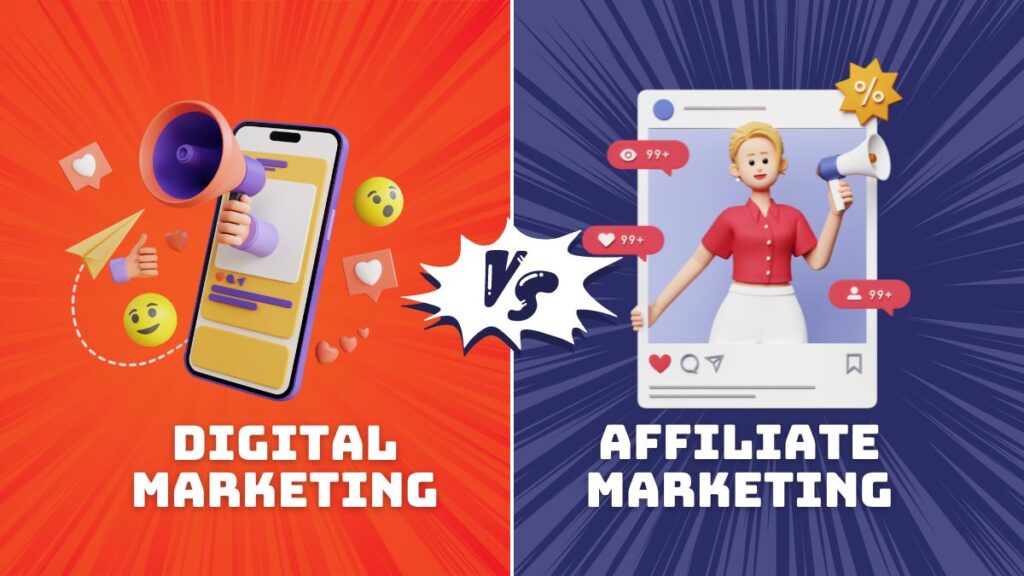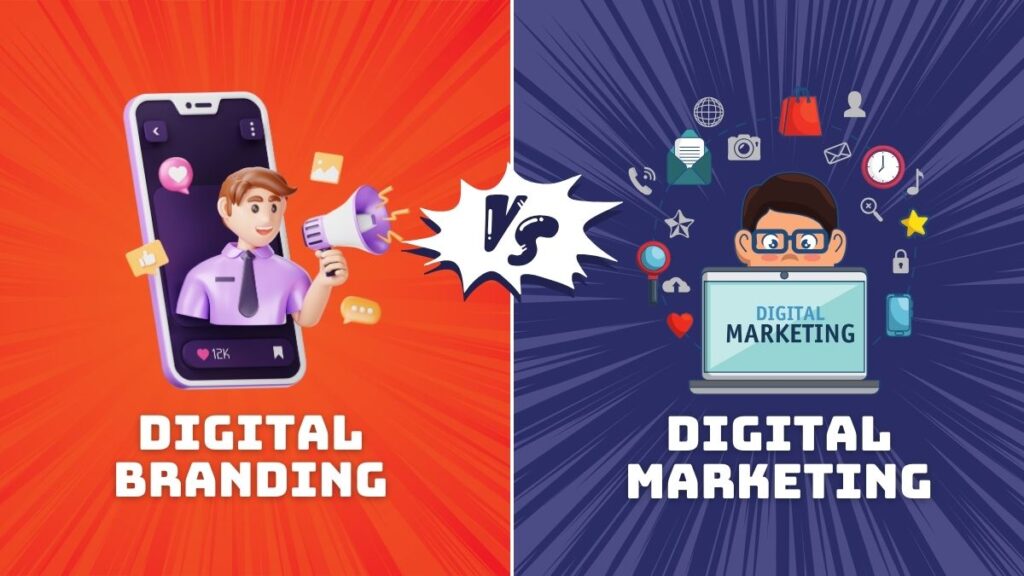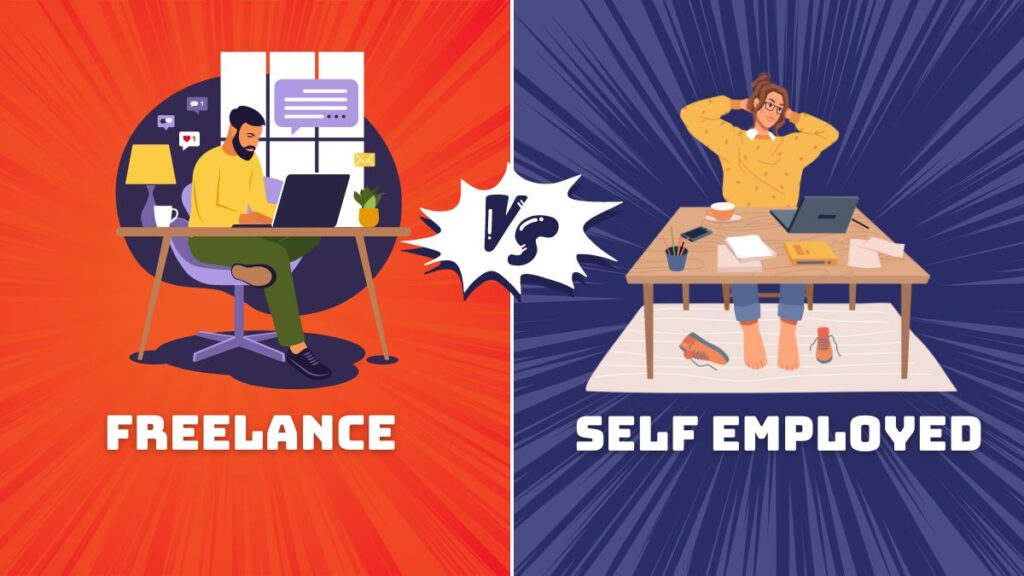In today’s fast digital world, businesses need smart ways to get noticed. So, which strategy works best? Let’s look at two options: digital marketing and affiliate marketing.
Digital Marketing: This lets you connect directly with your audience using tools like SEO, social media, and ads. 73% of businesses use digital marketing to grow online.
Affiliate Marketing: This means others promote your product and earn a commission for each sale. Affiliate marketing in the U.S. is expected to reach $8.2 billion by 2026.
Which one to choose? Why not both? Using both strategies can help your business grow faster. Don’t miss out—these strategies can make a big impact!
Digital Marketing vs Affiliate Marketing
Not sure whether to choose Digital Marketing vs Affiliate Marketing? Let’s break down both options and see which one can help your business grow faster!
| Aspect | Digital Marketing | Affiliate Marketing |
|---|---|---|
| Definition | Promoting your business online through various channels like social media, SEO, and email. | Promoting products through affiliates who earn a commission for each sale they generate. |
| Main Focus | Broader approach to online marketing using multiple strategies. | Focuses on partnering with affiliates to drive sales. |
| Costs | Can involve upfront costs for ads, tools, and campaigns. | Pay only when affiliates make a sale, so it’s more performance-based. |
| Methods | SEO, content marketing, social media marketing, email marketing, PPC ads. | Affiliate links, commissions, and partnerships with affiliates or influencers. |
| Control | Full control over all marketing strategies and execution. | Less control as affiliates handle the promotion of your product. |
| Reach | Can reach a broad audience across various platforms. | Relies on affiliates’ existing audience to promote your product. |
| Payment Model | Often involves fixed budgets or ongoing payments for ads and services. | Pay affiliates a commission only when they generate sales. |
| Flexibility | Can be adapted and customized with multiple strategies. | Limited to the affiliate’s promotion methods and audience. |
| Risk | Higher upfront costs with uncertain results. | Lower risk as you pay only for actual sales. |
| Scalability | Can scale by increasing ad spend, content production, or social media outreach. | Scalable by adding more affiliates without increasing direct costs. |
Digital Marketing: A Powerful Way to Grow Your Business
Digital marketing is promoting your business online through websites, social media, search engines, and emails. It is a cost-effective way to grow your business, connect with customers, and track results. It’s flexible and can help you reach more people while keeping your budget manageable.
Key Components of Digital Marketing
SEO (Search Engine Optimization)
Content Marketing
Social Media Marketing
Email Marketing
PPC (Pay-Per-Click) Ads
Affiliate Marketing
Influencer Marketing
Benefits of Digital Marketing
Want to know how Digital Marketing can help your business grow? Let’s explore the amazing benefits that make it a must-have for success!
Reach More People: You can reach customers anywhere in the world.
Affordable: It’s cheaper than traditional marketing methods.
Target the Right People: You can focus on people who are more likely to be interested in your product.
Track Your Success: You can see how well your ads are doing and make improvements.
Build Relationships with Customers: It allows you to interact directly with your customers.
Affiliate Marketing: A Simple Way to Boost Your Sales
Affiliate marketing is an easy way to grow your business. You partner with affiliates (people or companies) who promote your product, and they earn a commission for each sale they bring in. This way, you only pay for results, making it a cost-effective option.
Key Components
Affiliates
Tracking Links
Commission Structure
Affiliate Program
Benefits of Affiliate Marketing
Curious about how Affiliate Marketing can boost your business? Let’s dive into the key benefits and why it’s a smart choice for growth!
Affordable: You only pay for sales made, which keeps costs low.
Wider Reach: Affiliates help you reach a larger audience that you might not have access to.
Scalable: As you add more affiliates, you can grow your sales without much extra work.
Less Effort: Affiliates do most of the marketing, so you don’t have to spend as much time on ads.
Build Trust: Affiliates, especially influencers, have a loyal audience that trusts their recommendations.
Choosing the Right Strategy
Struggling to decide the best strategy for your business? Let’s explore how to choose between Digital Marketing and Affiliate Marketing to achieve your goals!
Business Goals
Digital Marketing
Great for building brand awareness and reaching a wide audience through social media, content, and email.
Affiliate Marketing
Perfect if you want to increase sales fast by paying affiliates based on actual sales or clicks.
Budget
Digital Marketing
Can be more expensive upfront due to ads and content, but gives you control and long-term results.
Affiliate Marketing
Cheaper to start since you only pay for actual results like sales or clicks.
Target Audience
Digital Marketing
Best for reaching people where they spend time, like social media or search engines.
Affiliate Marketing
Works by finding partners who already have an audience that fits your target customers.
Resources
Digital Marketing
Requires time and effort to manage ads, create content, and engage with customers.
Affiliate Marketing
Easier to manage because you work with partners who help promote your business.
By looking at your goals, budget, audience, and resources, you can choose the best strategy for your business.
Combining Both Strategies
You don’t have to pick just one strategy. Many businesses do well by combining digital marketing and affiliate marketing. Here’s how you can make both work together:
Synergy
Drive Traffic
Use digital marketing to bring visitors to your website through ads, social media, or content.
Boost Sales
After driving traffic, let affiliates help close the deal by promoting your products or services to their audience.
Cost Efficiency
This combination allows you to maximize your budget—digital marketing brings awareness, while affiliates help turn that awareness into actual sales.
Integrated Campaigns
Unified Messaging
Run a digital marketing campaign that includes social media ads, email marketing, or content creation. Make sure affiliates share the same messaging to keep everything aligned.
Cross-Promotion
Include affiliate links in your digital marketing materials like blogs, videos, or social posts. This encourages affiliates to promote your content or products, increasing reach.
Teamwork
Collaborate with affiliates on special campaigns, product launches, or exclusive offers to generate buzz and attract more customers.
Tracking
Measure Both
Use tools like Google Analytics and affiliate dashboards to track the performance of both your digital marketing efforts and affiliate sales.
Adjust as Needed
Look at data from both strategies to see which is performing better. If one method is driving more conversions, focus more effort there.
Optimize
Regularly check and optimize your campaigns. Make adjustments to both digital marketing and affiliate strategies based on what the data shows.
Digital Marketing vs Affiliate Marketing Cost
Curious about the costs of Digital Marketing vs Affiliate Marketing? Let’s compare their expenses and find out which fits your budget better!
| Aspect | Digital Marketing | Affiliate Marketing |
|---|---|---|
| Initial Setup Cost | Can require a significant upfront investment (e.g., website development, software, ad tools). | Usually low cost to start; mainly focused on setting up an affiliate program. |
| Ongoing Costs | Costs for running ads, creating content, paying employees or agencies, and using marketing tools. | Pay only when affiliates generate sales, so ongoing costs depend on performance. |
| Advertising Costs | Includes costs for social media ads, Google ads, email campaigns, etc. | No upfront ad costs. Affiliates handle promotion; you only pay them a commission. |
| Tool and Platform Fees | May require subscriptions for tools (SEO, email marketing, analytics) or ad platforms. | Some affiliate platforms charge a fee, but many are free or low-cost. |
| Payment Structure | Often a fixed cost for ads or services, or ongoing payments for campaigns. | Affiliates earn a commission (percentage of sales) based on performance. |
| Scalability Costs | Can scale by increasing ad spend, hiring more staff, or expanding content. | Scalable by adding more affiliates without increasing direct costs. |
In Summary
Digital Marketing typically involves more upfront and ongoing costs for ads, tools, and content creation.
Affiliate Marketing is more cost-effective as you only pay for sales made, and there are no upfront ad costs.
Digital Marketing vs Affiliate Marketing Examples (Freelance Only)
Curious about how freelancers use Digital Marketing and Affiliate Marketing? Check out simple examples to see how these strategies help freelancers succeed!
Digital Marketing (Freelance)
Freelancers use Digital Marketing to find clients and grow their business. They run social media ads, create content, and build their online presence to stand out.
Example 1: Social Media Manager
You create and manage social media accounts for businesses (Facebook, Instagram, etc.).
You plan posts, respond to comments, and run paid ads to get more people to visit the business’s website.
Example 2: Content Writer
You write blog posts, articles, or website content for businesses.
Your work helps websites rank higher on search engines, which brings in more visitors.
Example 3: Email Marketing Specialist
You design and send email campaigns to businesses’ customers.
You focus on keeping customers engaged and promoting sales or special offers.
Affiliate Marketing (Freelance)
Freelancers use Affiliate Marketing to earn by promoting products or services. They share links, write reviews, and get paid for every sale they help make.”
Example 1: Blogger
You write blog posts about products and include affiliate links.
When readers click the links and make a purchase, you earn a commission.
Example 2: YouTuber
You create product reviews or tutorials and add affiliate links in your video descriptions.
You earn money when viewers buy the products through your links.
Example 3: Website Owner
You create a niche website and include affiliate links to products.
Your goal is to drive traffic to your site and earn money when people make purchases through your links.
In Digital Marketing, freelancers help businesses grow through ads, content, and emails. In Affiliate Marketing, freelancers earn commissions by promoting other companies’ products.
How I Can Help?
I can help businesses grow through my skills in Digital Marketing and Affiliate Marketing. Here’s how I can assist, with some real-life examples to show the results:
Digital Marketing
Wondering how Digital Marketing can help? I can help you reach more people, build your online presence, and attract more clients.
Social Media Strategy
I’ll create targeted campaigns to boost your brand’s presence, increase engagement, and grow your followers on platforms like Instagram, Facebook, and X.
Case Study: I worked with a fashion startup and grew their Instagram following by 150% in just 3 months. This helped increase website traffic by 40%, bringing more potential customers to their online store.
Content Creation
I can write blog posts, articles, and videos that attract visitors and keep them coming back for more. This helps build trust and brings in more leads.
Case Study: For a health and wellness brand, I created SEO-friendly blog content that increased organic traffic by 70% over 6 months. As a result, the brand ranked higher on Google and attracted more customers.
SEO and Paid Ads
I’ll optimize your website for search engines (SEO) and run effective paid ad campaigns to get more traffic and sales.
Case Study: For a tech company, I helped optimize their Google Ads and landing pages, leading to a 30% increase in online sales. This was achieved by targeting the right keywords and improving the user experience on their site.
Affiliate Marketing
Wondering how Affiliate Marketing can help? I can connect you with the right partners to promote your products and boost sales.
Affiliate Partnerships
I’ll connect your business with the right affiliates to help promote your products and bring in more sales.
Case Study: I helped a beauty brand create a strong affiliate network. Within 6 months, affiliates generated over $100,000 in sales by sharing their products with their audience.
Content for Affiliate Campaigns
I can create engaging content, like blog posts and videos, with affiliate links that encourage people to buy your products.
Case Study: For an e-commerce platform, I developed a series of blog posts that promoted products through affiliate links. This boosted affiliate-driven sales by 50% in just 2 months.
Tracking and Optimization
I’ll set up tracking tools to measure how well your affiliate campaigns are doing, and help improve them for better results.
Case Study: I worked with a tech company to track affiliate sales and adjust commission structures. By optimizing the affiliate strategy, we boosted their affiliate revenue by 25%.
With my expertise in digital and affiliate marketing, I can help your business grow by increasing your online visibility, driving more traffic, and ultimately boosting sales, just like the businesses in these examples.
Let’s work together to make it happen!
Conclusion
Digital Marketing and Affiliate Marketing each have their strengths. Your choice depends on your goals, budget, and what you can manage.
Digital marketing is great for building your brand over time, while affiliate marketing can bring in quick, performance-based results.
Key Takeaways
Want to grow your business? Get in touch with me, and I’ll help you combine digital and affiliate marketing for the best results!


